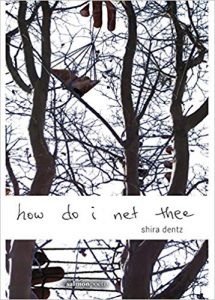Book Review
Shira Dentz’s third full-length book, how do i net thee, begs the response its title invokes: “let me count the ways.” The ways of this collection are numerous, from the modified dictionary entry for “net” that announces the book’s scope with a long, curving black line that swoops in upon its text—a thread of the object being defined—to short lyrics to prose poems to typographical experiments. Who, or what, can be captured in such open forms is this book’s question, and it asks it in the aftermath of personal and familial loss.
In the opening poem, “Wax,” Dentz writes: “flowers float along water my brother a steed’s dark flank glistening back a cloud’s / shadow subtitles / it was sunny and a bit of thought passed.”
No sooner are we introduced to the brother (a recurring figure) than he is transformed. Are we to read him as water, or animal part, or simply as he is, brother? The dense syntax allows for each of these possibilities and suggests that the contours of this fraternal relationship are porous, multivalent, and being renavigated through language. For language may be all that’s left of it, even when it feels insufficient, as Dentz writes at the poem’s closing: “knife the heat breath there’s not anything more to say about the brother.”
Although the speaker may have nothing more to say, the poetic line can’t help but tell us more. Note the impersonal shift to “the” rather than “my” brother, a subtle increase in distance, as if to say he is beyond belonging to any one sibling, any one personal pronoun—perhaps he belongs to us all. Then there’s the slurry of “knife the heat breath” being poured into the flow of conventional grammar, registering sensation in a way that regular speech cannot. To be speechless, as we often are in grief, is not to be without words, without voice, but to redistribute what language remains into stacks and bawls and nonsense, dirge and elegy, stray marks on pages. Although the poems never explain what has happened to the brother besides him needing to go to the hospital, we surmise because the language keeps “breaking the trance of UNION family union,” as Dentz writes in “Marsupium.”
But how do i net thee is not a book-length elegy; it is a record of the need to constantly revise one’s account of the world. Dentz enacts this before our eyes, and through our hands. The third section introduces the conceit with “Surfaces fast as blood,” a poem that forces us to spin the book to read its lines, groups of which are mirrored, run vertically, or set at ninety-degree angles to one another. The page seems to have no center; the spine toggles between being a y and x axis. We manipulate the book like a bubble level, waiting for the poem to settle. Such handling reminds us that reading is a physical act—that English, which asks us to read it from left to right, forces our bodies into certain postures. Dentz wants us to feel them, and to feel what it is to not know where to start, or to have to start elsewhere.
And to end elsewhere, for “Surfaces fast as blood” is followed by another version of itself, which has a conventional layout and has undergone revision. This one begins “the mother and the father spreading,” whereas in the prior version that line seemed to be just one way in to the poem. The other choices, such as “hanging like a bat” becoming “enclosed / like a bat,” or “another night the mother. shouting / in red orange yellow” newly rendered as “another night the mother shouting it to / an unfamiliar guide” ask us to flip back and forth between the versions, comparing, considering, weighing the lines against one another. As a result, no choice feels final. The poems argue for coexistence rather than closure, and put process and product on equal footing. This gesture is not new territory, but its marshaling at this point in the book is apt. It returns us to the titular net, which paradoxically encloses by virtue of being mostly open. And it calls up the insufficiency of the many versions of the phrase, “to get some closure,” “have you gotten closure,” “I hope you get some closure,” so often invoked in the wake of death or lost relationships. We may be foolish in seeking it, these poems suggest, but it is in our nature to do so anyway.
The poetic forms continue to seek and stray as how do i net thee builds toward its final, seventh section. We encounter erasures with grayed-out text, a poem that includes the printer’s marks for bleed and page margins, and a concrete poem in the shape of a pine cone. This determined plenitude also includes quieter lyric poems, which resonate because of the restless company they keep. The declarative sentences of “Motion,” for example, are like clear peals of a bell. They satisfy because we know so well their pattern of beginning, sustaining, ending. But such a pause is just a pause, as the book soon reminds us. By the end of it we have moved through such wide territory, from grief to parenthood to autumnal beauty to the cost of cherries, that we are aware there is no way to contain multitudes except to cast multifaceted forms. Language may be the best net for this we have, even though we know most of life will slip right through.
About the Reviewer
Andrew Seguin is the author of The Room In Which I Work, selected by Calvin Bedient as the winner of Omnidawn’s Open Prize. His other work includes the chapbooks NN and Black Anecdote, as well as a series of cyanotypes inspired by Moby-Dick. A former Fulbright scholar, Andrew lives and works in New York City.
